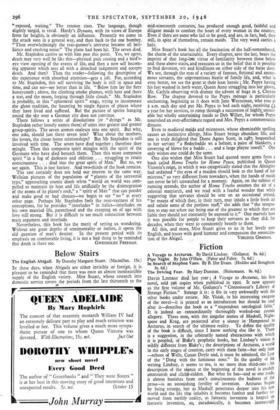When You Die
Death into Life. By Olaf Staplerlon. (Methuen. 7s. 6d.)
THIS book was bound to raise hopes, and then disappoint them. For it begins with death and goes on to vaster and vaster themes—all human history, the peopling of the planets, the end of this world, the merging of " the spirit of Man" into " the Other." Nobody can fail to be interested in man's final destiny, but equally almost any picture of such immense issues, however honest, however undoctrinal, is disappointing. On his fifth page, writing of the stars, Mr. Staple- don says: " And what their significance might be " no " earth-bound intelligence could ever know." He has made a brave leap to glimpse the secret, but by his failure has proved his own thesis of the impossibility of knowing. He begins well—with a subject that is still lurking in our minds with mixed pride and horror : air-raids over Germany. " Ten thou- sand boys in the ufSper air." We are admitted into one of the bombers with its seven boys and a trapped moth. (The significance of the moth, apparently so great, turns out to be disappointingly vague.) We enter the mind of the rear-gunner ; see what he sees-- darkness, stars, the Channel and then the German city underneath, "exposed, waiting." The tension rises. The language, though slightly turgid, is vivid. Hardy's Dynasts, with its views Of Europe from far heights, is obviously an influence. Presently we come to the attack seen in a general way, and then back to the one bomber. "Then overwhelmingly the rear-gunner's universe became all bril- liance and crashing noise." The plane had been hit. The seven died.
Mr. Stapledon carries us with him past this point. Yes, we agree, death may very well be like this—physical pain ceasing and a bird's- eye -view opening of the events of life, and then a new self becom- ing apparent which sees all with a detached judgement and accepts death. And then? Then the reader—following the description of the experience with absorbed attention—gets a jolt. For, according to Mr. Stapledon, this self surviving the body is still in space and time, and can see—see better than in life. " Below him lay the fiery honeycomb - above, the climbing smoke plumes, with here and there a star, and the moon, forging through little clouds." Mr. Stapledon is probably, in this " ephemeral spirit." stage, trying to incorporate the ghost tradition, the haunting by single figures of places where they have lived and suffered. Bute the picture of spirits hanging round the sky over a German city does not convince.
There follows a series of dissolutions (or " dyings " as Mr. Stapledon rather loosely names them). of 'units into greater and greater group-spirits. The seven airmen coalesce into one spirit. But why, one asks, should just these seven join? What about the mothers, the lovers, the closer home relationships? But Mr Stapledon is still involved with time. The seven have died together ; therefore they mingle. Then this composite spirit mingles with the spirit of the Germans who have died beneath them. Then this more composite spirit "in a fog of darkness and oblivion . . . struggling to retain consciousness . . . died into the great spirit of Man." But no, we say.again. This is just fantasy. And two-thirds of the book remains.
The rest certainly does not hold our interest in the same way. Wellsian pictures of the population of "planets of the terrestrial type," approaching cosmic death when "world on world was com- pelled to maintain its heat and life artificially by the disintegration of the atoms of its planet's rock," a " spirit of Man " that can ponder and make good or bad choices—we begin to say " no " at every other page. Perhaps Mr. Staptedon feels the over-vastness of his conceptions, for he provides " interludes " in italics—interludes on his own married life, parenthood and the creeping on of age with love Still strong. But it is difficult to see much connection between main argument and interlude.
Nevertheless, this book has the merit of setting us wondering. Without any great depths of sentimentality or bathos, it opens the old question of man's destiny. In the present period with its emphasis on comfortable living, it is not a bad thing to be reminded



























 Previous page
Previous page